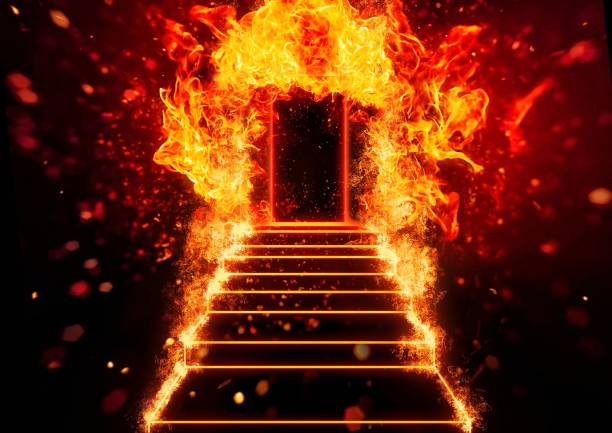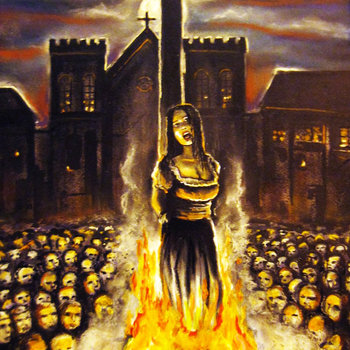 Hell ain’t a bad place to be: Honey I’m home!
Hell ain’t a bad place to be: Honey I’m home!
Again, I’m amazed to find that the idea of Hell is not in the Bible, at least, not in the New Testament. In her book, Joan O’Grady seems a little mystified as to where the idea of Hell, and the Devil presiding over the damned, came from. I expect it was largely a creation of the Church. I mean, much of what is in Christianity is based on the Bible, but a lot is made up by men who lived a long time after its assumed authors had turned to dust. If the Pope and his bishops needed to further terrorise their flock to keep them in check, what better way than to invent a place, the very antithesis of Heaven, where evil souls went after death? The existence of the place is hinted at in the Gnostic Scripture, and certainly people like Milton and Dante built on that image, but I would imagine the main thrust of it came from brimstone-preaching pulpit-thumpers, haranguing the terrified congregation into submissive obedience by warning them that they were all on, as Bon Scott once sang, a highway to Hell, and that the only ride off this infernal interstate was by flagging down Jesus and begging for a lift.
The very idea of Hell is nonsense. If we’re supposed to believe that God is always ready to forgive and love us, then why would such a being create, or allow to be created, such a site of misery? Why would he allow souls to be “stolen” from him, diverted to a dark place of fire and torture and repentance and regret, with no hope of salvation? But as a means of keeping control over a largely superstitious and cowed audience, it’s perfect. Be good or you will never see God when you die is a reasonably worrying warning, but be good or you’ll go to Hell when you die is a lot more effective. The problem there of course is the word good. How do you define that, and how many levels of good are there? If you break one small rule, are you damned forever? If you follow the main rules but ignore the smaller ones are you on Scott’s road to perdition? And what about if you repent on your deathbed? Isn’t God supposed to be always ready to forgive?
Consider too the Harrowing of Hell, again confined to the Gnostic Gospels - most notably the Book of St. Nicodemus - which tells of Christ feeling bored while kicking around the tomb waiting for resurrection day to roll around and deciding to take a trip down to Hell, to see if he can’t release some souls, pass the time that way. Well let’s ask this question: if Hell was supposed to be the place where “bad” souls went, and Christ found “good” souls there - or at least ones he believed worthy of redemption - then what the hell (pun intended) were they doing there in the first place? Was this the biggest administrative cock-up in celestial history? Did St. Peter tie one on the previous night and send a whole bunch of innocent or redeemable souls to the wrong destination? Did someone rubberstamp the wrong form? Was it that damn YTS kid again?
Right. As if.

Someone (I think it might have been Spock) said if there are self-made hells, we all have to live in them, and I actually think this is the correct interpretation of Hell. Hell could be seen as the removal forever of the possibility of ever seeing God - I think Anne Rice uses this in
Memnoch the Devil - the despair engendered by knowing that you have lost your chance of salvation, that God’s face is forever turned away from you, that Heaven will always be closed to you and that you will never walk its green fields could be sufficient punishment in and of itself. If we consider the burning shame, the regret this entails, perhaps that’s where the idea of flames may have taken hold. In medieval times - and later - suspected witches were burned at the stake, but if Christian belief was right, and could be taken literally, then they were s
hit out of luck because when their suffering ceased on this earth it was going to continue, for all eternity, in hotter flames that never went out. Kind of overkill, no? I suppose to some degree you could look then upon the stake as being a kind of dry run for the real thing.
So Hell becomes the Devil’s domain, and because it’s painted as a place of fire and smoke, lakes of sulphur etc, the Devil takes on its characteristics, and his form gains a new colour: red. Now his skin is red, his eyes are red, his wings are red. He doesn’t necessarily belch fire (because who needs to when you’re surrounded every day by the stuff?) but essentially he’s kind of reverted back to the original figure of the dragon, a being who can survive in, and indeed thrives in fire.
To return to the idea of Hell for a moment, and examine it a little more in detail, consider how any dark place, crack in the ground, chasm, ravine and especially volcano - where red-hot lava comes bubbling up to the surface and spills onto the ground, the very image of Hell spewing its red rivers - is anathema to us. Other than, obviously, those who explore or study such phenomena, nobody would get too close to such places for fear of falling in, or (while most of us would not admit it) something emerging from that place and dragging us down into its domain. We’re taught from an early age that such places are dangerous and to be avoided, possibly why we also conflate the idea of Hell with not say for instance walking into or being driven there, but of falling into it. If holes and pits are terrifying and dangerous, then Hell is the most terrifying and dangerous pit of all. Fall in there, and you won’t just break your neck, you’ll break your soul.
And there’s no way out. This is possibly another of the things I find odd about the concept of Hell. If we’re supposed to always be able to repent, if forgiveness is always just there, if we reach for it, if we strive for it, if we want it, then what is Hell? The point where God folds his arms and says “Nope! You had your chance, now you’re damned.” Anyone who goes to Hell (faith teaches) can never come back out again. Purgatory/Limbo is another matter, a sort of waystation for souls (yeah how stupid is that?) while God decides their fate, but once you’ve been consigned to the flames, you’re there for all eternity. So is it that anyone, facing such horror, would repent, and so that repentance can’t be taken as genuine, driven as it is by terror and the urgent desire to leave Hell? If - to stretch the analogy to almost breaking point - God wanted people to be good, why not give them a short stay in Hell, show them what it’s like, and like those kids who get sent to jail just to straighten them out on reality shows, shake them up, give them a vision of what they’re headed for?
But no. Hell is the final stop, according to the Church, and once you’re there you can’t come back. So then what is the point? If, like the supposed idea of prison, the point is to rehabilitate the soul, where’s the reward waiting at the end? There’s no parole, you’re in for life - afterlife, all eternity - so it can only be a form of punishment. Does that sound like the God we’re supposed to believe in? That he would abandon his children, literally, to the fire, turn his back on them and leave them to their fate?
What a bastard, huh?